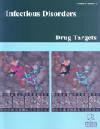-
s Reprogramming of B Cells into Regulatory Cells with Engineered Fusokines
- Source: Infectious Disorders - Drug Targets, Volume 12, Issue 3, Jun 2012, p. 248 - 254
-
- 01 Jun 2012
Abstract
B cells play a pivotal role in host adaptive immunity against pathogenic microorganisms, but may also maladaptively contribute to the pathogenesis of autoimmune diseases. In contrast, distinct B cell subsets have the capacity to regulate host immune response, and suppress inflammation. B regulatory cells are a rare population of endogenous Blymphocytes defined in part by production of the anti-inflammatory cytokine IL-10. Although “natural” B regulatory cells exist in vivo, the low frequency of B regulatory cells may be a limiting factor on their impact in autoimmune ailments. In answer to this unmet need, we have developed a novel strategy for alternate lymphoid activation: fusokines. These wholly engineered chimeric leukines fuse two functionally unrelated cytokines for the purpose of alternate immune modulation. The GM-CSF- and IL-15-derived fusokine: GIFT15, possesses entirely novel and unheralded immune modulating properties mediated through the IL15 receptor which reprograms naive B cells into B regulatory cells (Bregs). In this article, we review the current approaches to generate Bregs in vitro, and highlight gain-of-function mechanisms by which GIFT15- induced Bregs abrogate pathogenic autoimmunity in mice. We also demonstrate that the human equivalent of inducible Bregs may also serve as a new potent therapeutic tool for treatment of autoimmune disease.


